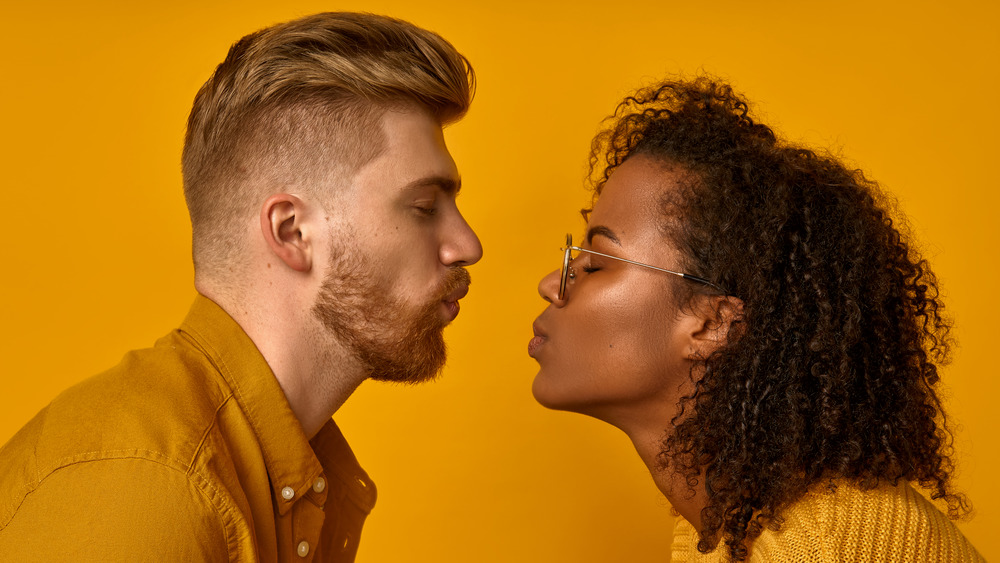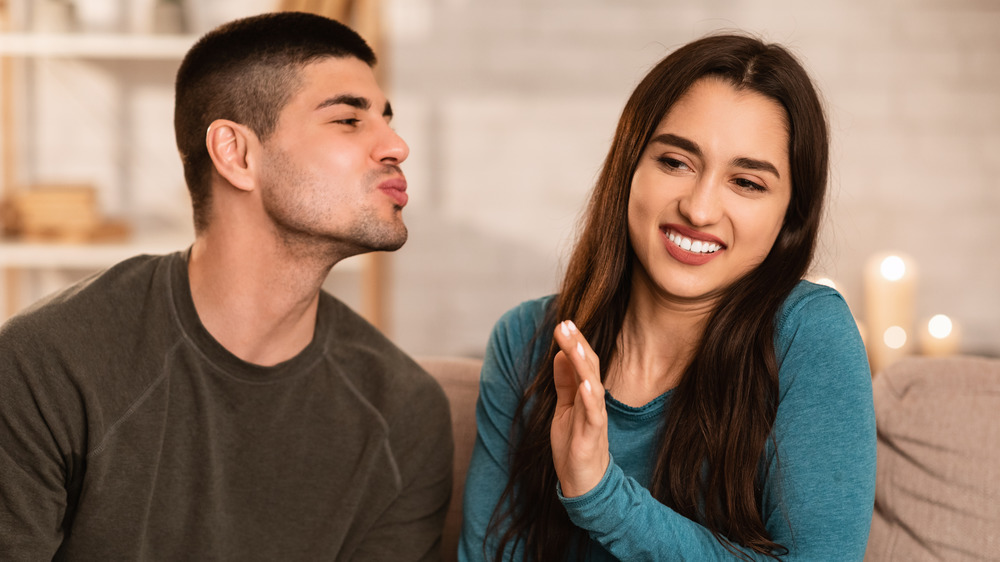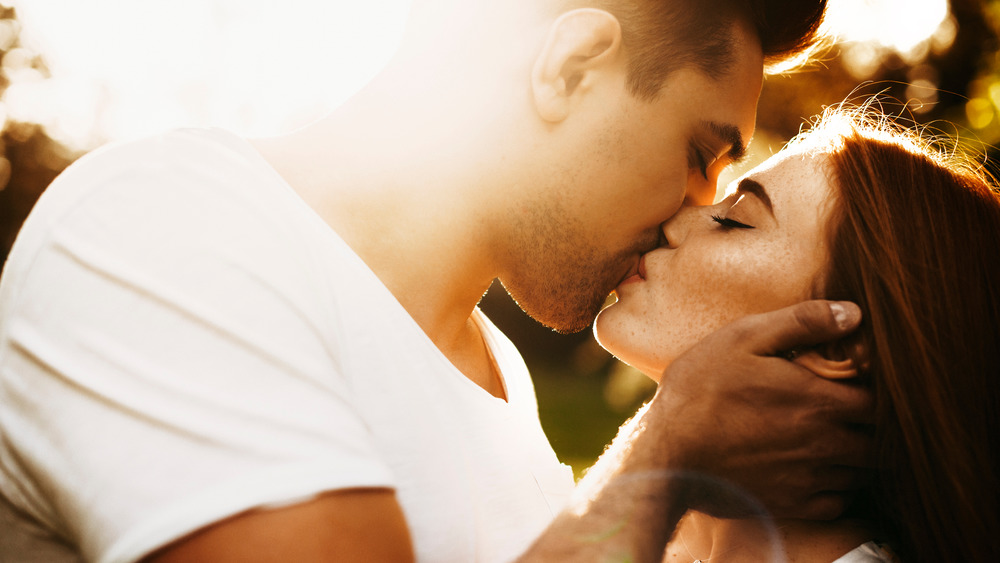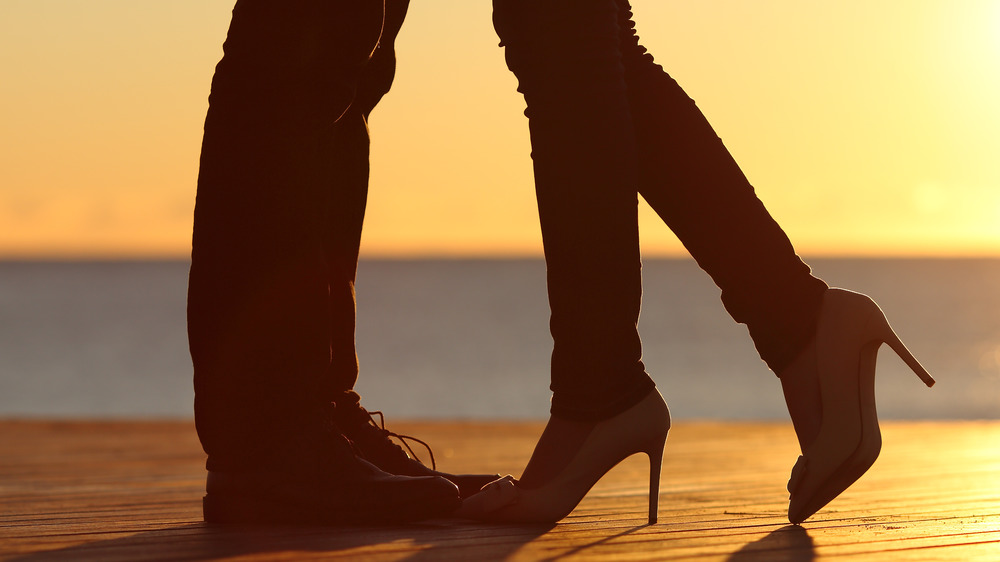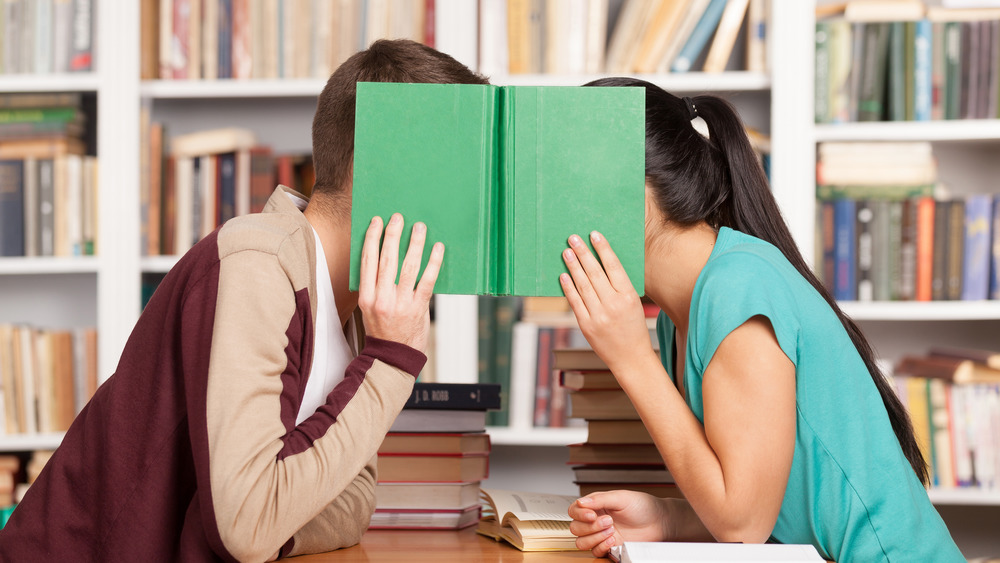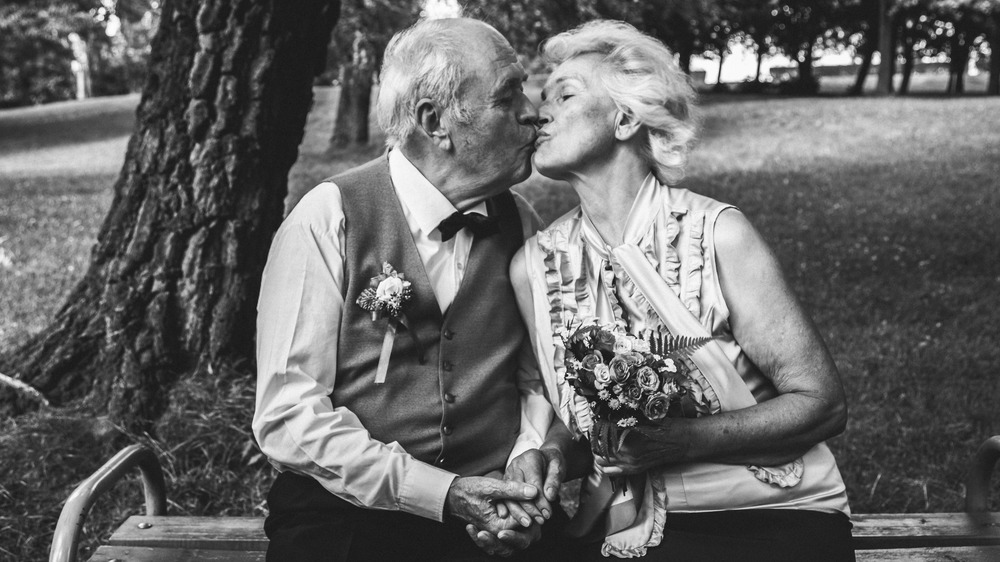Things About Kissing You Probably Never Wanted To Know
Kissing is a weird, wonderful, and almost exclusively human trait. Yes, some primates kiss but, interestingly, not all humans do. Research found that just 46 percent of cultures throughout human history have engaged in romantic kissing. In societies that have developed a "taste" for kissing, though, people have definitely worked hard to master it. After all, kissing is complicated. You use up to 146 different muscles when you kiss. We also spend a large portion of our lives kissing — 20,160 minutes (14 days) on average.
Of course, this time is well spent because kissing is incredibly pleasurable. In fact, our lips are actually one of the most sensitive spots on our bodies (even more sensitive than other areas), with up to 10,000 individual nerve endings. Still, as amazing as a good kiss can be, there are some disturbing things you may not be aware of that happen when we kiss— things that only happen when two individuals press their lips together in a sexy yet sloppy passionate exchange of saliva. Read on to find out everything you probably never wanted to know about locking lips.
Kissing can cause a flurry of hormonal and chemical reactions within your body
That woozy, weak-in-the-knees feeling you experience after a good kiss? Turns out it's not just in your head. Science has proven our bodies undergo a whirlwind of chemical changes when we lock lips with a partner.
For starters, our brains release the chemical dopamine when we kiss, which is directly linked to feelings of pleasure in the brain. Kissing also causes the release of the feel good neurotransmitter serotonin. As serotonin levels increase in the body, your mood improves, triggering the feel good spark you feel after a good kiss. Finally, our bodies also increase production of a hormone called oxytocin during a kiss. Known as the love hormone, oxytocin is also produced during foreplay and orgasms and is believed to increase the bond or attachment within couples.
"What I found so fascinating is that the chemicals in our bodies are responsible for the so-called symptoms we associate with falling in love," Sheril Kirshenbaum, author of The Science of Kissing: What Our Lips Are Telling Us, told Time. "I don't think it takes the romance out of the equation, but it gives us a better scientific understanding of how our bodies are behaving."
Kissing with your eyes open leads to a less satisfying experience
There's a reason humans are seemingly born knowing we should shut our eyes during a kiss. And it's not just good manners or fear of the person we're kissing staring back from just a couple inches away. No, the actual reason we kiss with our eyes shut is because kissing is so stimulating, our brains have a hard time processing a passionate kiss when we do it with our eyes open, a study in the Journal of Experimental Psychology has suggested.
Researchers in the U.K. had 16 volunteers complete a series of puzzles that involved searching for specific letters. While they were completing the puzzle, the scientists delivered a brief random vibration to their hands. The more demanding the puzzles became, the less likely the volunteers were to notice the vibration.
This finding implies that reducing visual demands by shutting your eyes may improve tactile awareness, which could also help you feel a kiss more intensely, cognitive psychologists and co-authors of the study Polly Dalton and Sandra Murphy told The Independent. Keeping your eyes shut also blocks out other distractions, leaving the brain with more capacity to focus on the kiss, she said.
Even a hint of bad breath can make your partner subconsciously think of you as a bad kisser
Most of the animal world relies on scent for the detection of a possible mate. Animals give off strong smelly chemicals called pheromones that tell prospective suitors about their overall health, according to the BBC. Scent may have also played a role in our development of kissing — a process "that places individuals in close proximity to each other in order to smell, taste, and assess other features that may contribute to making mate assessments," a study published in Evolutionary Psychology revealed.
Because a person's breath can reveal symptoms of underlying health problems, researchers set out to find out just how much breath and taste during a kiss impact a person's evaluation of a potential mate. After surveying 1,041 college students, they found that kissing was key for women to determine if they would have sex with men. They also found that the quality of a person's breath was also an important factor, with bad breath being a sure deal breaker. This isn't just because bad breath is, well, gross, but also because it suggests the offender may be inclined to inferior quality genes that could negatively impact future offspring.
Kissing spreads millions of bacteria into your system
Here's a visual you never wanted: A 10-second kiss can spread as many as 80 million bacteria from one person's mouth into the other, according to a study published in the journal Microbiome. Researchers in the Netherlands made the shocking discovery after studying the kissing behavior and levels of bacteria within the bodies of 21 couples. First, the researchers surveyed the individuals and found how often they kissed each other. Then they swabbed their mouths and compared levels of bacteria. The results revealed that the more often the couples intimately kissed, the more similar the levels of bacteria in their mouths became.
To further test these findings, the researchers then tasked one person from each couple with drinking a probiotic shake containing specific trackable bacteria. After the couples kissed for 10 seconds, the scientists measured the bacteria levels within the mouths of the people who'd received the kiss. "We wanted to find out the extent to which partners share their oral microbiota — and it turns out, the more a couple kiss, the more similar they are," the study's lead author Remco Kort confirmed to Science Daily.
Kissing is one of the most common ways cold sores are spread
Even if you never kiss a person with a visible cold sore, your chances of getting oral herpes (aka herpes simplex virus type 1 or HSV-1) is high. Johns Hopkins Medicine estimates that 50 to 80 percent of American adults have oral herpes — and 90 percent of adults will have been exposed to the virus by age 50.
"One of the most common ways the virus is spread is through kissing, because the virus frequently occurs around the mouth and the lips," dermatologist Joshua Zeichner told Abreva. All transmission takes is skin-to-skin contact with someone who carries the virus. You can get it from contact with cold sores, saliva, or other surfaces in and around the mouth.
Cold sores first appear as a tingling, itching, or burning feeling on your upper or lower lip, according to Cedars-Sinai. Then, a fluid-filled blister will appear, gradually growing in size until it bursts — a process that can take up to three weeks! There's no cure for HSV-1, and once you have the virus in your system, it's there for life, flaring up most often following overexposure to the sun, fevers, extreme stress, or menstruation (via Saint Luke's).
Kissing can put you at risk for this infectious disease
In an era in which many are concerned about the spread of COVID-19, you may wonder about the safety of kissing. Although we often think of respiratory droplets being expelled during a cough or a sneeze, kissing puts you into direct contact with those droplets, and is thus a way coronavirus can be spread, the Mayo Clinic has warned. However, kissing may not increase your risk for the common cold or flu.
"The common cold virus travels in the mucus from the respiratory system, so unless you have a bad cough, and some of the respiratory mucus has made its way into your saliva, the cold virus will not be transmitted by kissing," Professor Ron Eccles, director of the Common Cold Center at Cardiff University, told HuffPost.
Similarly, in a review of viruses spread through kissing, European physicians concluded "it is unlikely that kissing could constitute a route for transmission" for the virus that causes influenza. In the case of both colds and the flu, experts say that it's important to keep your hands clean. "Your fingers can easily become contaminated with viruses by holding hands with someone who has coughed or sneezed into their hands, or by touching door handles in public places," Eccles said.
Kissing can increase your risk for cavities and gum disease
Even the sexiest kiss can lead to cavities and gum disease. "Cavities are caused by bacteria that stick to teeth and feast on food particles and produce acid that causes tooth decay," dentist Emanuel Layliev explained to Self. And these common bacteria can be passed from one mouth to another whenever there is an exchange in saliva, he said.
Similarly, the American Academy of Periodontology has warned that conditions like gingivitis (gum disease) can also be spread through kissing. The inflammation that causes both conditions is linked to bacteria within the mouth and, according to The New York Times, researchers have found that transmission of this bacteria through kissing is not only possible, but occurs all the time.
While a simple peck on the lips won't put you at risk, open-mouth kissing definitely can. Your best protection, Dr. Layliev advised, is to always cleanse your mouth with an antiseptic rinse following passionate kissing and to always brush and floss regularly so bacteria are removed from your mouth before they have the chance to cause significant damage.
You're almost certainly going to get the kissing disease
There's a reason people call mononucleosis (or mono) "the kissing disease." Although there are other ways to catch the virus — sharing utensils or glasses or coming in contact with infected nasal fluids, blood, or semen — a primary mode of transmission is through saliva. This is why it is easy to catch through kissing. All it takes is coming into contact with a bit of infected saliva, and there's a good chance you'll become infected.
Transmission occurs incredibly easily — so easily, in fact, that more than 95 percent of Americans will develop mono at some point during their lifetimes, Dr. Todd Wills, an assistant professor of infectious diseases and international medicine at the University of South Florida, revealed in an ABC News article. While 50 percent of children are infected with the virus before the age of five, it doesn't only affect children.
People of all ages can develop mono and, like chicken pox, once the virus is in your system, it's there forever. Symptoms of mono can include fatigue, sore throat, fever, swollen lymph nodes in the neck and armpits, swollen tonsils, headaches or rash, and extreme fatigue that may last for several months (via The Mayo Clinic).
Men can pass this hormone to their partners through kissing
Research shows that when a man kisses a woman, testosterone, the male sex hormone, is actually spread to her. According to Rutgers University anthropologist Helen Fisher, a man's saliva contains small amounts of testosterone. During wet kisses, especially, this testosterone can be transferred, perhaps in an unconscious attempt to stimulate a partner's sex drive, she told Live Science.
Researchers speculate there are a number of reasons why the spread of testosterone through kissing may occur. According to Time, studies conducted by Gordon Gallup of the University of Albany suggest that the spread of testosterone may cause women to be more receptive to sex. "In saliva exchange — whether that's over weeks or months or even years — trace amounts of testosterone in male saliva could raise testosterone levels in the female and therefore increase her receptivity and her libido," he said. Time explained, "Men also use kissing to ... make themselves attractive to desirable ones."
Your brain can synchronize with the person you're kissing
There may be a reason older couples can finish each other's sentences after spending years together kissing and cuddling. Science suggests the brain can actually start to sync with the brain of your partner when you share a kiss. And the more you enjoy the kiss, the greater the synchronization can be. This is great news if you're looking for someone to spend your life with, but perhaps not welcome information if you're just sharing a kiss in a casual relationship.
Researchers in Germany reported on the brain syncing discovery in a study published in the journal PLOS One. In the study, the researchers had a group of 15 couples kiss repeatedly following different tasks. Their brains were scanned throughout the length of the experiment, following each kiss. The result: When the couples kissed, their brain activity spiked and became more harmonious. "I would suggest that kissing synchronizes our brains to produce a state or conditions for a better understanding of each other — or for getting in the right mood for partner-oriented behavior," the study's co-author Viktor Müller told the University of California, Berkeley's Greater Good magazine.
A bad kiss can make or break a relationship
Admit it: There's probably been a time in your life when you thought about dumping the person you were with because of a lousy kiss. Even if the thought crossed your mind for just a second, you can take solace in knowing you're not alone. According to research published in Evolutionary Psychology, 59 percent of men and 66 percent of women revealed that they have indeed found they stopped being interested in someone after kissing them. Researchers made the interesting discovery after surveying nearly 200 people.
While an individual's bad kissing technique may play a role in that decision, it's also likely the result of chemistry. Kissing is a complex activity and touching lips helps transfer all kinds of information about our physical health to our partners, explained the study's author, Gordon Gallup. This exchange of chemical information appears to help us subconsciously evaluate each other to see if we are a good match for future mating. Sometimes we are, and sometimes we just don't click with the other individual chemically.
Not kissing your partner regularly could shorten your life
The secret to longevity could be getting in plenty of kisses with the person you love. When researchers in Germany spent two years studying the lives, careers, and personal habits of a group of men, they found that individuals who kissed their spouses every morning before leaving the house were sick less often, were involved in fewer car accidents, earned higher salaries, and even lived an average of five years longer than individuals who didn't kiss their spouses regularly (via Psychology Today). Rather than the power of love helping these men to do so well, scientists speculate that kissing your spouse in the morning increases confidence and helps you start the day in a positive way.
A separate report by Indiana's Kinsey Institute supports this idea. In their survey of over 1,000 couples who had been together an average of 25 years, they found that couples who kissed and cuddled most frequently were also the happiest and most satisfied with their lives overall.
Kissing can cause you to have an allergic reaction
You might expect that getting close with a person who owns a pet you're allergic to or who is wearing a scented perfume or cologne would trigger an eventual allergic reaction, but kissing can wind up triggering a food allergy.
The American College of Allergy, Asthma and Immunology (ACAAI explained to Medical News Today that kissing someone who's eaten a food you're allergic to can lead to you having a reaction — even if you didn't eat any of that food yourself. ACAAI president Sami Bahna said that a person's saliva can excrete allergens from foods or medications for hours following the food or medicine being absorbed into the body.
The expert then explained the case of a 30-year-old male patient who was allergic to nuts and whose mouth would itch and lips would swell after a kiss with his girlfriend, even if it had been hours since she had eaten peanuts. His advice for anybody with a severe food allergy: If possible, make sure your partner doesn't eat anything you are allergic to for 16 to 24 hours before open-mouth kissing.
Long-term relationships may thrive or fail due to kissing
The success or failure of a relationship may be impacted by how often a couple kisses. The finding comes from a paper published in the Archives of Sexual Behavior. To study the importance of kissing within long-term relationships, researchers analyzed data collected from 1,605 individuals in committed relationships of at least two years. In addition to studying how often the individuals reported kissing their significant other, the study's authors also analyzed how frequently the individuals were aroused, their level of arousal, and their overall sexual satisfaction within their relationship.
The result: The more frequently individuals kissed their partner, the higher they rated their satisfaction with both their sex life and their relationship as a whole. "Kissing can be a useful tool in helping the emotional and sexual aspects of relationships grow stronger," the study's author Veronica Hanna-Walker told PsyPost. In addition to increasing levels of sexual arousal and increasing the likelihood of orgasms during sex, kissing also helps partners to form a closer bond and grow more attached to one another, she said. "Kissing is a small part of romantic relationships, but it is important to not forget it."

